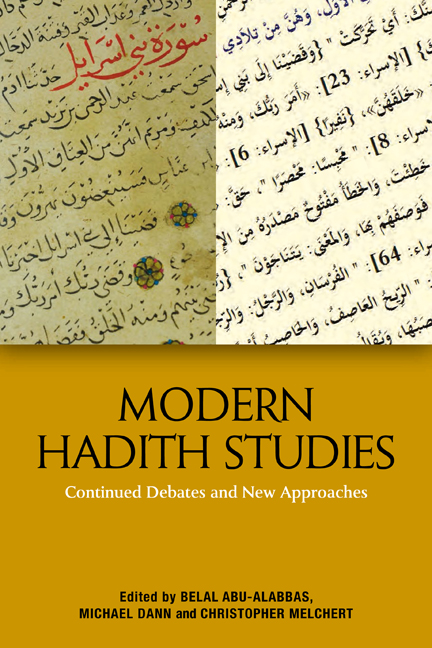Book contents
- Frontmatter
- Contents
- Figures and Tables
- Acknowledgements
- Note on Conventions
- Notes on Contributors
- Introduction
- 1 Kunnā nakrahu al-kitāb: Scripture, Transmission of Knowledge, and Politics in the Second Century AH (719–816 ce)
- 2 The History of the Adhān: a View from the Hadith Literature
- 3 Ibn al-Mubārak, Traditionist
- 4 Early ‘Traditionist Sufis’: A Network Analysis
- 5 The Common Link and its Relation to Hadith Terminology
- 6 Hadith Criticism between Traditionists and Jurisprudents
- 7 Hadith Criticism in the Levant in the Twentieth Century: From ẓāhir al-isnād to ʿilal al-ḥadīth
- 8 The Reception and Representation of Western Hadith Studies in Turkish Academe
- 9 Can Different Questions Yield the Same Answers? Islamic and Western Scholarship on Shiʿi Narrators in the Sunni Tradition
- Index
3 - Ibn al-Mubārak, Traditionist
Published online by Cambridge University Press: 01 October 2020
- Frontmatter
- Contents
- Figures and Tables
- Acknowledgements
- Note on Conventions
- Notes on Contributors
- Introduction
- 1 Kunnā nakrahu al-kitāb: Scripture, Transmission of Knowledge, and Politics in the Second Century AH (719–816 ce)
- 2 The History of the Adhān: a View from the Hadith Literature
- 3 Ibn al-Mubārak, Traditionist
- 4 Early ‘Traditionist Sufis’: A Network Analysis
- 5 The Common Link and its Relation to Hadith Terminology
- 6 Hadith Criticism between Traditionists and Jurisprudents
- 7 Hadith Criticism in the Levant in the Twentieth Century: From ẓāhir al-isnād to ʿilal al-ḥadīth
- 8 The Reception and Representation of Western Hadith Studies in Turkish Academe
- 9 Can Different Questions Yield the Same Answers? Islamic and Western Scholarship on Shiʿi Narrators in the Sunni Tradition
- Index
Summary
Ibn al-Mubārak (d. 181/797) is most famous for two collections of hadith, al-Jihād and al-Zuhd. Two others attributed to him are the additional collections al-Musnad and Kitāb al-Birr wa-al-ṣilah. He has been the subject of five monographs that I know of: four in Arabic, one in English. Ibn al-Mubārak also figured prominently in a 1975 article by Raif Georges Khoury, a 1996 book by Michael Bonner, a 2007 book by D. G. Tor, a 2009 article by Roberta Denaro, and a 2015 article by this author. The following chapter is mainly a review essay comparing Salem's book and the four earlier ones in Arabic, then some new research by me.
Arabic Monographs to Date
The earliest of the Arabic monographs is that of Muḥammad ʿUthmān Jamāl, published in 1971. To his credit, Jamāl covers the main aspects of his importance in chapters on ‘Ibn al-Mubārak the traditionist’, ‘Ibn al-Mubārak the jurisprudent’ and ‘his Sufism’. On the other hand, he relies heavily on earlier synthetic scholarship, not discriminating between early and late sources. For example, he lists his shaykhs in hadith as named by Ibn Ḥajar, and then adds eleven named only by al-Nawawī. He does not assemble names from the works of Ibn al-Mubārak (admittedly in manuscript as yet except for al-Zuhd). And he hardly indicates that any of what he relates is controversial, such as Ibn al-Mubārak's relation to Abū Ḥanīfah, which he characterises as the loyalty of a disciple to his master, citing works of the thirteenth–twentieth centuries.
The next biography to have appeared is that of ʿAbd al-Majīd al-Muḥtasib, published in 1972. Like Jamāl, al-Muḥtasib quotes medieval biographical sources to establish the events of his life, his teaching and his reputation. He spends no time on the works of Ibn al-Mubārak himself. That of ʿIṣām Muḥammad al-Ḥājj ʿAlī, published in 1990, is an even shorter synthesis of the biographical literature.
- Type
- Chapter
- Information
- Modern Hadith StudiesContinuing Debates and New Approaches, pp. 49 - 69Publisher: Edinburgh University PressPrint publication year: 2020



